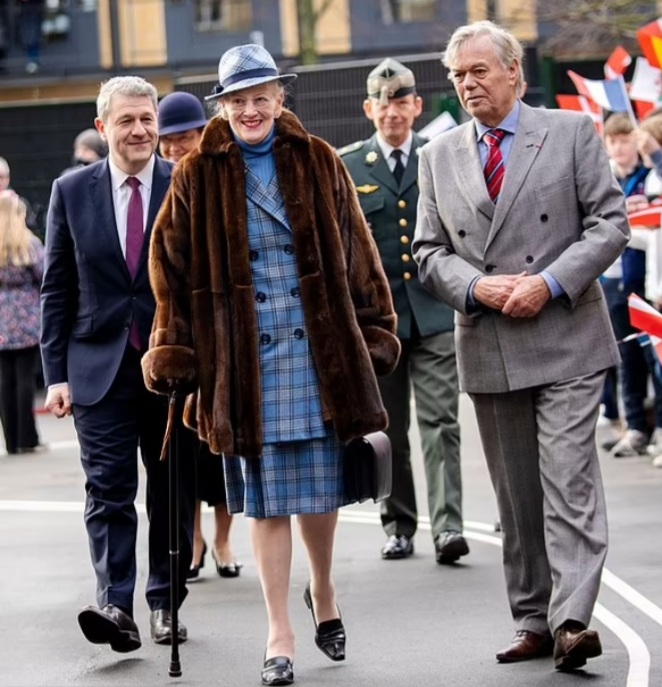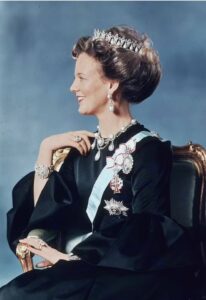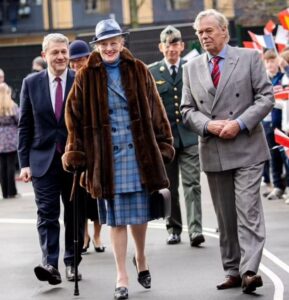CELEBRITY
Queen Margrethe of Denmark, 84, hospitalised after fall at Fredensborg Castle

Queen Margrethe of Denmark has been hospitalised following a fall at Fredensborg Castle.
The royal, 84, abdicated in January in favour of her son King Frederik.
She is in stable condition, but will remain in the hospital for monitoring, a statement from the palace said.

Margrethe, a third cousin of Queen Elizabeth, was scheduled to participate in an event at Aarhus University on Friday but has now pulled out.
Her Majesty, known for her chain-smoking and love of dachshunds, was last seen on Monday as she attended the Rungstedlund Prize 2024 at the Karen Blixen Museum.
Despite resigning in her New Year’s Eve speech last year, the monarch remains active and performs royal duties alongside her son.

Fredensborg Castle, on the Dutch island of Zealand, is the royal family’s country seat where they spend the summer.
Margrethe shocked the nation with the announcement of her abdication during her New Year’s Eve live television segment.
Just 14 days later, Margrethe, who ruled for 52 years, signed away the throne at a Council of State meeting and her son, Frederik, was crowned King of Denmark.
She said one of the reasons why she chose to give up the throne was because of her health issues, adding that she underwent surgery for her back in February 2023.
She said: ‘It went well, thanks to the skilled healthcare staff who took care of me. Of course, the operation also gave rise to thinking about the future – whether the time had come to leave the responsibility to the next generation.’
She is still known as Her Majesty Queen Margrethe and can fill in as regent if King Frederik, Queen Mary and Crown Prince Christian are abroad, ill or on holiday.
Just one week after giving up the crown, the royal went to a special church service at Aarhus Cathedral with her son, King Frederik and his wife Queen Mary.
In Denmark, formal power resides with the elected parliament and its government. The monarch is expected to stay above partisan politics, representing the nation with traditional duties ranging from state visits to national day celebrations.
Born in 1940, Margrethe has throughout her life enjoyed broad support from Danes, who are fond of her tactful and yet creative personality, the Prime Minster has previously described her as ‘the epitome of Denmark’.
She enjoyed a close relationship with her third cousin Queen Elizabeth II, both descendants of Queen Victoria, having bonded during several state visits to each other’s countries down the decades – most recently in 2000, when Margrethe was received at Windsor.
The six-feet-tall Margrethe has been one of the most popular public figures in Denmark. She often walked the streets of Copenhagen virtually unescorted and won the admiration of Danes for her warm manners and for her talents as a linguist and designer.
A keen skier, she was a member of a Danish women’s air force unit as a princess, taking part in judo courses and endurance tests in the snow.
1972
In 2011, at age 70, she visited Danish troops in southern Afghanistan wearing a military jumpsuit.
As monarch, she crisscrossed the country and regularly visited Greenland and the Faeroe Islands, the two semi-independent territories which are part of the Danish Realm, and was met everywhere by cheering crowds.
Denmark has Europe’s oldest ruling monarchy, which traces its line back to the Viking king Gorm the Old, who died in 958. Although Margrethe is head of state, the Danish Constitution strictly ruled out her involvement in party politics.
Margrethe was a week after Nazi Germany had invaded Denmark. The occupation meant that the little princess became a symbol of hope for the Danes.
She ascended the throne on January 15, 1972, after the death of her father.
But, although she was his eldest child, she did not become heir presumptive until 1953, when Denmark’s constitution was amended to allow women to inherit the throne.
That followed a referendum in which more than 85 per cent of participants voted to allow female succession.
She was married in 1967 to a Frenchman, Henri Marie Jean André de Laborde de Monpezat, later styled as Prince Henrik. They had two sons, Prince Frederick and Prince Joachim.
Despite enjoying a long marriage of 50 years, her relationship with Henrik was plagued with controversy. Henrik stunned Danes by saying he felt he had been pushed aside in his own home by his wife.
Prince Henrik died in 2018 aged 83.
On the day she became monarch, she appeared on the balcony of Denmark’s Christiansborg Palace and pledged her allegiance to the nation.










